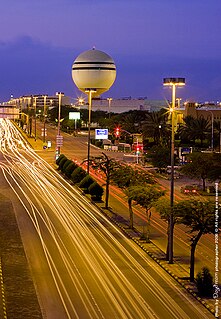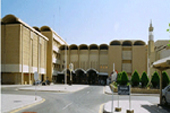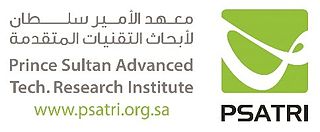
Riyadh is the capital of Saudi Arabia and the largest city on the Arabian Peninsula. Located in the center of the an-Nafud desert, on the eastern part of the Najd plateau, the city sits at an average of 600 metres (2,000 ft) above sea level, and receives around 5 million tourists each year, making it the forty-ninth most visited city in the world and the 6th in the Middle East. Riyadh had a population of 7.6 million people in 2019, making it the most-populous city in Saudi Arabia, 3rd most populous in the Middle East, and 38th most populous in Asia.

The Qassim Province, also known as the Qassim Region, and officially the Emirate of Al-Qassim Province, is one of the 13 provinces of Saudi Arabia. Located at the heart of the country near the geographic center of the Arabian Peninsula, it has a population of 1,370,727 and an area of 58,046 km². It is known to be the "alimental basket" of the country, for its agricultural assets. It’s widely regarded as the most conservative region in Saudi Arabia.
King Saud University is a public university in Riyadh, Saudi Arabia, founded in 1957 by King Saud bin Abdulaziz as Riyadh University, as the first university in the Kingdom of Saudi Arabia. The university was created to meet the shortage of skilled workers in Saudi Arabia. It was renamed King Saud University in 1982.

Buraidah is the capital of Al-Qassim Region in northcentral Saudi Arabia in the heart of the Arabian Peninsula. Buraydah lies equidistant from the Red Sea to the west and Arabian Gulf to the east. It has a population of 619,739.

Al Kharj is a governorate in central Saudi Arabia. It is one of the important governorates in the Kingdom of Saudi Arabia and is located in the southeast of the capital Riyadh, within an area of 19,790 km2 ~ 4,890,215.5 acres, and a population of 376,325 people, according to the statistics of the General Authority for Statistics for the year 2010. The city of Al Saih is the capital of modern Al-Kharj and its administrative and economic center.

Articles related to Saudi Arabia include:
Ali Abdullah Al-Daffa is a noted mathematician, scientist, author, professor, and expert on the history of science and Islam.

King Saud bin Abdulaziz University for Health Sciences (KSAU-HS) is the first public university in the Kingdom of Saudi Arabia and the Middle East region specialized in health sciences. Its headquarters is in the main campus in Riyadh, the capital of Saudi Arabia. It has two other campuses in Jeddah and Al-Ahsa.

The Prince Sultan Institute for Environmental, Water and Desert Research is a Saudi Institute was established in 1986 under the name "Center for Desert Studies". It is as an independently administered research organization directly linked to the rector's office of King Saud University. The Center's purpose is to design and conduct scientific research which is related to desert development and to combating desertification in the Arabian Peninsula.
Maher Alodan is a Vice President for Research & Graduate Studies and acting dean of the College of Engineering at Alfaisal University in Riyadh, Saudi Arabia.
Australians in Saudi Arabia are a sizeable community consisting mainly of expatriates. Their population is estimated to be anywhere up to 5,000 with the majority based in major commercial centres such as Riyadh and Jeddah. Most Australian citizens in Saudi Arabia tend to be occupational-oriented and are employed mainly in the health, education, construction and technology sectors. There are approximately 1,000 Australians who live in Jeddah alone, a city which serves as the country's main port and economic hub. In addition, thousands of Australian Muslims travel and stay in Saudi Arabia each year, often intending to visit the two holiest cities of Islam, Mecca and Medina. Many expatriates in Saudi Arabia are attracted to what they refer to as "the good life", including large salaries and tax-free jobs, consistent weather and a comfortable social life within their housing compounds.
Princess Nourah Bint Abdulrahman University is a public women's university located in Riyadh, the capital of Saudi Arabia. It is the largest women's university in the world.
The King Abdullah Petroleum Studies and Research Center (KAPSARC) is a non-profit institution for independent research into global energy economics located in Riyadh, Saudi Arabia. Founded on July 10, 2007, by the Saudi Council of Ministers, the center brings together an international group of expert researchers of more than 15 nationalities, with a mandate to advance the understanding of domestic and global energy challenges and opportunities, through objective research that informs quality decision-making to enhance global economic outlook.
The following is a Gregorian timeline of the history for the city of Riyadh, Saudi Arabia.

The College of Medicine in King Saud University was established as the first medical college in the Kingdom in 1967. One year later, King Abdul-Aziz University Hospital, became affiliated with the college and subsequently in 1981, King Khalid University Hospital and the new college building were established to become the main teaching campus and patient service facility. To date, the college has graduated more than 4000 undergraduate students, 200 postgraduates students, and more than 700 graduates from different medical specialties fellowship programs.

Prince Sultan Advanced Technology Research Institute is an independent scientific organization of the Saudi government, located in the College of Engineering at King Saud University in the capital city of Riyadh, Saudi Arabia. It has a branch office located in the Business Gate in addition to manufacturing lab and testing sites.
Mrsool Park is a football stadium located in Riyadh, Saudi Arabia. Until November 2020, the name of the stadium was King Saud University Stadium. In September 2020, Saudi Media Company won the management rights for operating the stadium. On October 26, 2020, SMC signed a deal with Al Nassr FC for the Mrsool Park to become their home.
Higher education in Saudi Arabia is the educational stage that follows the three years of secondary education. Higher education institutions are either governmental institutions or private institutions, and are mainly universities, colleges, and academies. There are three higher educational levels in Saudi Arabia: Bachelor's degree, Master's degree, and Doctorate. Governmental universities in Saudi Arabia offer free bachelor's degree education for Saudis and a monthly payment for each student during their studying period.








